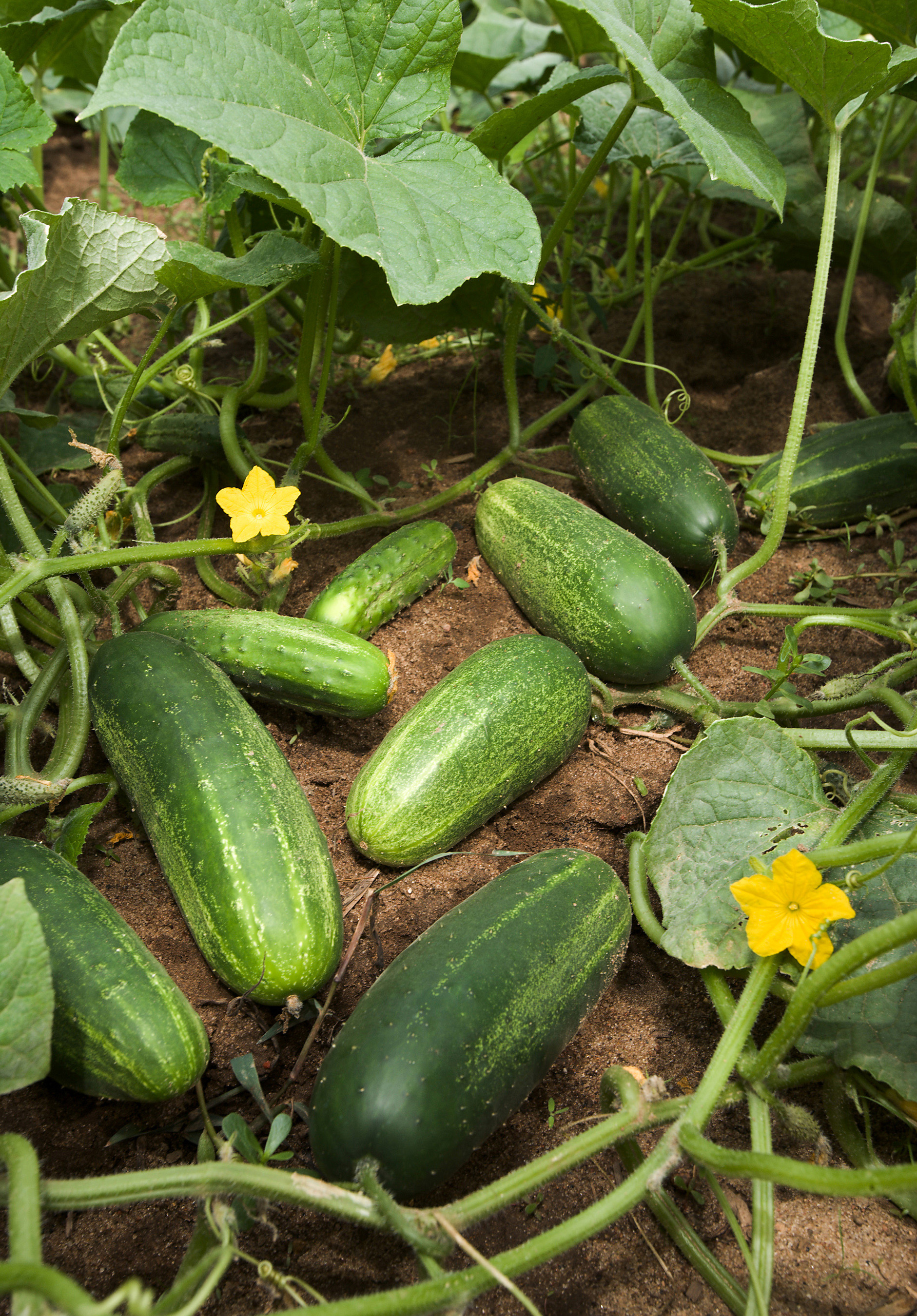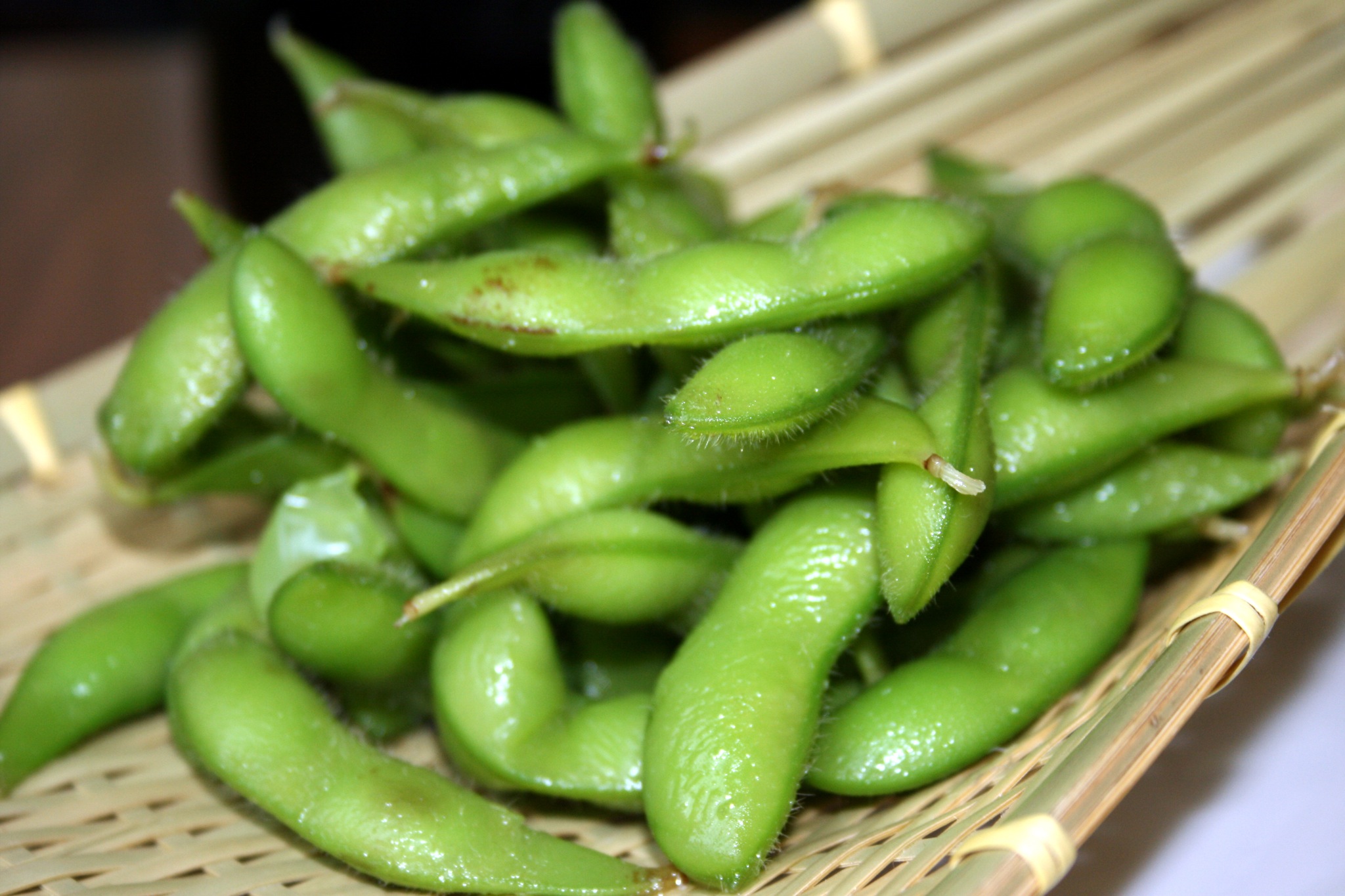Cucumber vs. Edamame
Nutrition comparison of Cucumber and Edamame
Ever wonder how your favorite foods stack up against each other in terms of nutrition?
We compared the nutritional contents of
cucumber
versus
edamame
(100g each)
below using 2020 USDA and NIH data[1].
For a quick recap of significant nutrients and differences in cucumber and edamame:
- Edamame has more thiamin, riboflavin, niacin, Vitamin B6 and folate.
- Edamame is a great source of iron and protein.
- Edamame is an excellent source of calcium, dietary fiber and potassium.
USDA sources for nutritional information: Cucumber (Cucumber, with peel, raw) and Edamame (Edamame, frozen, prepared) . Have a correction or suggestions? Shoot us an email.
Calories and Carbs
calories
Edamame is high in calories and cucumber has 88% less calories than edamame - cucumber has 15 calories per 100 grams and edamame has 121 calories.
For macronutrient ratios, cucumber is much lighter in protein, much heavier in carbs and much lighter in fat compared to edamame per calorie. Cucumber has a macronutrient ratio of 15:80:5 and for edamame, 37:27:36 for protein, carbohydrates and fat from calories.
Macro Ratios from Calories:
| Cucumber | Edamame | |
|---|---|---|
| Protein | 15% | 37% |
| Carbohydrates | 80% | 27% |
| Fat | 5% | 36% |
| Alcohol | ~ | ~ |
carbohydrates
Cucumber and edamame contain similar amounts of carbs - cucumber has 3.6g of total carbs per 100 grams and edamame has 8.9g of carbohydrates.
The carbs in cucumber are made of 56% sugar, 28% starch and 17% dietary fiber, whereas the carbs in edamame comprise of 58% dietary fiber, 25% sugar and 17% starch.
dietary fiber
Edamame is an excellent source of dietary fiber and it has 940% more dietary fiber than cucumber - cucumber has 0.5g of dietary fiber per 100 grams and edamame has 5.2g of dietary fiber.
sugar
Cucumber and edamame contain similar amounts of sugar - cucumber has 1.7g of sugar per 100 grams and edamame has 2.2g of sugar.
Protein
protein
Edamame is a great source of protein and it has 17 times more protein than cucumber - cucumber has 0.65g of protein per 100 grams and edamame has 11.9g of protein.
Fat
saturated fat
Both cucumber and edamame are low in saturated fat - cucumber has 0.04g of saturated fat per 100 grams and edamame has 0.62g of saturated fat.
trans fat
Both edamame and cucumber are low in trans fat - edamame has 0.01g of trans fat per 100 grams and cucumber does not contain significant amounts.
Vitamins
Vitamin C
Edamame has 118% more Vitamin C than cucumber - cucumber has 2.8mg of Vitamin C per 100 grams and edamame has 6.1mg of Vitamin C.
Vitamin A
Cucumber and edamame contain similar amounts of Vitamin A - cucumber has 5ug of Vitamin A per 100 grams and edamame has 15ug of Vitamin A.
Vitamin E
Cucumber and edamame contain similar amounts of Vitamin E - cucumber has 0.03mg of Vitamin E per 100 grams and edamame has 0.68mg of Vitamin E.
Vitamin K
Cucumber and edamame contain similar amounts of Vitamin K - cucumber has 16.4ug of Vitamin K per 100 grams and edamame has 26.7ug of Vitamin K.
The B Vitamins
Edamame has more thiamin, riboflavin, niacin, Vitamin B6 and folate. Both cucumber and edamame contain significant amounts of pantothenic acid.
| Cucumber | Edamame | |
|---|---|---|
| Thiamin | 0.027 MG | 0.2 MG |
| Riboflavin | 0.033 MG | 0.155 MG |
| Niacin | 0.098 MG | 0.915 MG |
| Pantothenic acid | 0.259 MG | 0.395 MG |
| Vitamin B6 | 0.04 MG | 0.1 MG |
| Folate | 7 UG | 311 UG |
Minerals
calcium
Edamame is an excellent source of calcium and it has 294% more calcium than cucumber - cucumber has 16mg of calcium per 100 grams and edamame has 63mg of calcium.
iron
Edamame is a great source of iron and it has 711% more iron than cucumber - cucumber has 0.28mg of iron per 100 grams and edamame has 2.3mg of iron.
potassium
Edamame is an excellent source of potassium and it has 197% more potassium than cucumber - cucumber has 147mg of potassium per 100 grams and edamame has 436mg of potassium.
Antioxidants and Phytonutrients
carotenoids
Carotenoids are micronutrients commonly found in plants and some animal products. An example is beta-carotene, the notable carotenoid which is a popular source of Vitamin A.[4][5]
For specific types of carotenoids,
| Cucumber | Edamame | |
|---|---|---|
| beta-carotene | 45 UG | 175 UG |
| alpha-carotene | 11 UG | ~ |
| lutein + zeaxanthin | 23 UG | 1619 UG |
Omega-3 and Omega-6
omega 3s
For omega-3 fatty acids, edamame has more alpha linoleic acid (ALA) than cucumber per 100 grams.
| Cucumber | Edamame | |
|---|---|---|
| alpha linoleic acid | 0.005 G | 0.358 G |
| EPA | ~ | 0.003 G |
| Total | 0.005 G | 0.361 G |
omega 6s
Comparing omega-6 fatty acids, edamame has more linoleic acid than cucumber per 100 grams.
| Cucumber | Edamame | |
|---|---|---|
| linoleic acid | 0.028 G | 1.792 G |
| other omega 6 | ~ | 0.002 G |
| Total | 0.028 G | 1.794 G |
Customize your serving size
The comparison below is by common portions, e.g. cups, packages. You can also see a more concrete comparison by weight at equal weight (by grams) comparison.
Cucumber g
()
|
Daily Values (%) |
Edamame g
()
|
|||||
|---|---|---|---|---|---|---|---|
| KCAL % |
|
5% | calories | 5% |
|
KCAL % | |
| G % |
|
5% | carbohydrates | 5% |
|
G % | |
| G % |
|
5% | dietary fiber | 5% |
|
G % | |
| G | 5% | sugar | 5% | G | |||
| G % |
|
5% | total fat | 5% |
|
G % | |
| G % |
|
5% | saturated fat | 5% |
|
G % | |
| G | 5% | monounsaturated fat | 5% | G | |||
| G | 5% | polyunsaturated fat | 5% | G | |||
| G | 5% | trans fat | 5% | G | |||
| MG | 5% | cholesterol | 5% | MG | |||
| MG % |
|
5% | sodium | 5% |
|
MG % | |
| 5% | Vitamins and Minerals | 5% | |||||
| UG % |
|
5% | Vitamin A | 5% |
|
UG % | |
| MG % |
|
5% | Vitamin C | 5% |
|
MG % | |
| IU % |
|
5% | Vitamin D | 5% |
|
IU % | |
| MG % |
|
5% | calcium | 5% |
|
MG % | |
| MG % |
|
5% | iron | 5% |
|
MG % | |
| MG % |
|
5% | magnesium | 5% |
|
MG % | |
| MG % |
|
5% | potassium | 5% |
|
MG % | |
| MG % |
|
5% | thiamin (Vit B1) | 5% |
|
MG % | |
| MG % |
|
5% | riboflavin (Vit B2) | 5% |
|
MG % | |
| MG % |
|
5% | niacin (Vit B3) | 5% |
|
MG % | |
| MG % |
|
5% | Vitamin B6 | 5% |
|
MG % | |
| MG % |
|
5% | pantothenic acid (Vit B5) | 5% |
|
MG % | |
| UG % |
|
5% | folate (Vit B9) | 5% |
|
UG % | |
| UG % |
|
5% | Vitamin B12 | 5% |
|
UG % | |
| MG % |
|
5% | Vitamin E | 5% |
|
MG % | |
| UG % |
|
5% | Vitamin K | 5% |
|
UG % | |
| G % |
|
5% | protein | 5% |
|
G % | |
| UG % |
|
5% | biotin (Vit B7) | 5% |
|
UG % | |
| MG % |
|
5% | choline | 5% |
|
MG % | |
| MG % |
|
5% | chlorine | 5% |
|
MG % | |
| UG % |
|
5% | chromium | 5% |
|
UG % | |
| MG % |
|
5% | copper | 5% |
|
MG % | |
| UG % |
|
5% | fluoride | 5% |
|
UG % | |
| UG % |
|
5% | iodine | 5% |
|
UG % | |
| MG % |
|
5% | manganese | 5% |
|
MG % | |
| UG % |
|
5% | molybdenum | 5% |
|
UG % | |
| MG % |
|
5% | phosphorus | 5% |
|
MG % | |
| UG % |
|
5% | selenium | 5% |
|
UG % | |
| MG % |
|
5% | zinc | 5% |
|
MG % | |
| G | 5% | Water | 5% | G | |||
| G | 5% | Starch | 5% | G | |||
| G | 5% | Alcohol | 5% | G | |||
FAQ
Does cucumber or edamame contain more calories in 100 grams?Edamame is high in calories and cucumber has 90% less calories than edamame - cucumber has 15 calories in 100g and edamame has 121 calories.
Is cucumber or edamame better for protein?
Edamame is a great source of protein and it has 17 times more protein than cucumber - cucumber has 0.65g of protein per 100 grams and edamame has 11.9g of protein.
Does cucumber or edamame have more carbohydrates?
By weight, cucumber and edamame contain similar amounts of carbs - cucumber has 3.6g of carbs for 100g and edamame has 8.9g of carbohydrates. the carbs in cucumber are made of 60% sugar, 30% starch and 20% dietary fiber, whereas the carbs in edamame comprise of 60% dietary fiber, 30% sugar and 20% starch.
Does cucumber or edamame contain more calcium?
Edamame is a rich source of calcium and it has 290% more calcium than cucumber - cucumber has 16mg of calcium in 100 grams and edamame has 63mg of calcium.
Does cucumber or edamame contain more potassium?
Edamame is a rich source of potassium and it has 200% more potassium than cucumber - cucumber has 147mg of potassium in 100 grams and edamame has 436mg of potassium.

